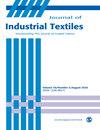The characteristic impedance calculation method of microstrip line and application in embroidered microstrip line
IF 2
4区 工程技术
Q1 MATERIALS SCIENCE, TEXTILES
引用次数: 0
Abstract
Presently, it is difficult to measure the characteristic impedance of embroidered microstrip line for its conductive anisotropy directly. The published work had proposed to use S-parameters to estimate the port impedance of a balanced dipole antenna, and it cannot be used to calculate the characteristic impedance of microstrip lines with one arm. Thus, it is still a problem on measuring and obtaining 50 Ω characteristic impedance of embroidered microstrip line. Therefore, taking the reflection coefficient as an intermediate variable, this work proposes to use return loss [Formula: see text] to derive the expression of the characteristic impedance of microstrip line. Combined theoretical calculation with experimental testing on characteristic impedance of the fabric-based microstrip line, the expression of the characteristic impedance was verified. Then, the expression of the characteristic impedance of microstrip line was used to calculate the characteristic impedance of embroidered microstrip line and determine its equivalent substrates. The results show that the fabric embroidered with a single-layer conductive strip is a part of its equivalent substrate, and the fabric embroidered with a double-layer conductive strip is not a part of its equivalent substrate.微带线特性阻抗的计算方法及其在刺绣微带线中的应用
刺绣微带线由于其导电各向异性,目前难以直接测量其特性阻抗。已发表的文献提出用s参数估计平衡偶极天线的端口阻抗,但不能用于计算单臂微带线的特性阻抗。因此,如何测量和获得绣花微带线的50 Ω特性阻抗仍然是一个问题。因此,本文以反射系数为中间变量,提出利用回波损耗[公式:见文]推导微带线特性阻抗表达式。结合对织物微带线特性阻抗的理论计算和实验测试,验证了特性阻抗的表达式。然后,利用微带线特性阻抗表达式计算刺绣微带线的特性阻抗,确定其等效衬底;结果表明,绣有单层导电条的织物是其等效基材的一部分,绣有双层导电条的织物不是其等效基材的一部分。
本文章由计算机程序翻译,如有差异,请以英文原文为准。
求助全文
约1分钟内获得全文
求助全文
来源期刊

Journal of Industrial Textiles
MATERIALS SCIENCE, TEXTILES-
CiteScore
5.30
自引率
18.80%
发文量
165
审稿时长
2.3 months
期刊介绍:
The Journal of Industrial Textiles is the only peer reviewed journal devoted exclusively to technology, processing, methodology, modelling and applications in technical textiles, nonwovens, coated and laminated fabrics, textile composites and nanofibers.
 求助内容:
求助内容: 应助结果提醒方式:
应助结果提醒方式:


